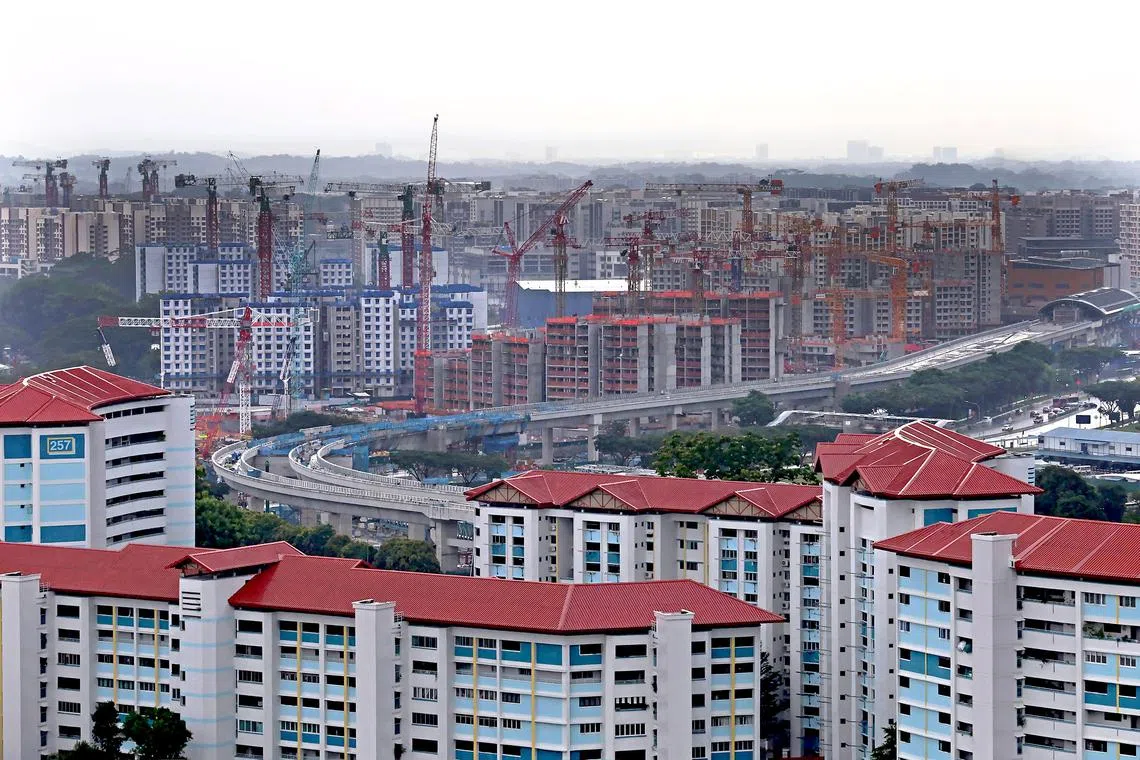BTO income ceiling, age floor for singles being reviewed: Chee Hong Tat
Sign up now: Get ST's newsletters delivered to your inbox

National Development Minister Chee Hong Tat said a continued strong supply of BTO flats is needed to make any changes to the eligibility conditions for flat buyers.
PHOTO: ST FILE
- 55,000 new BTO flats will be launched between 2025 and 2027.
- The Government aims to formalise the Business Improvement District (BID) model via new legislation to enliven commercial spaces.
- The Building Maintenance and Strata Management Act is being reviewed to help management corporations upgrade ageing private estates.
AI generated
SINGAPORE – The income ceiling for couples applying for Build-To-Order (BTO) flats, as well as the minimum age of 35 for singles purchasing flats, is being reviewed, and changes to these policies – if any – will depend on upcoming flat supply and demand, said National Development Minister Chee Hong Tat.
Speaking to local media on Aug 5, when he laid out some of his ministry’s priorities, Mr Chee said a continued strong supply of BTO flats is needed to make any changes to the eligibility conditions for flat buyers.
To this end, he said 55,000 BTO flats will be launched between 2025 and 2027 – 10 per cent more than the Government’s previous supply commitment of 50,000 flats
Apart from potential changes to public housing policies, Mr Chee also made announcements on plans to enliven commercial spaces, as well as improve the maintenance of private estates.
Eligibility conditions for flat buyers
On BTO eligibility conditions
“I want to assure Singaporeans that we are reviewing both income criteria and also the age requirement for singles, and at an appropriate time, we do intend to make some moves,” he said.
“But I want to make sure that when we make those moves, we will not end up with a situation where there is insufficient supply,” he added, noting that the Government has worked very hard to ease the BTO supply crunch caused by the Covid-19 pandemic, when many applicants were not able to choose flats, or faced a very long wait for their new homes.
From 2021 to 2024, 82,710 BTO flats were launched – more than 20,600 per year on average – while about 19,600 are slated to be launched in 2025, with 10,579 launched thus far.
Mr Chee said demand for new flats remains strong, including from young couples who want to own their own home while also living near their parents, instead of the whole family living in the same flat – a practice more common in the past.
Whether the income ceiling for couples and the minimum age for singles can be adjusted depends on the supply that can be introduced over the next few years, he said.
“Because you can imagine, if we lower the age limit for singles, or if we raise the income threshold, there will be more applicants who qualify, and therefore demand will go up,” Mr Chee said, adding that this demand cannot be met without a strong supply of BTO flats.
“I think it is important for us to create the right conditions to be able to make these policy moves at an appropriate time.”
Only when there is sufficient supply to meet increased flat demand can the income ceiling for couples, or age threshold for singles, be tweaked, he said.
Business improvement districts
The Ministry of National Development will propose new legislation to formalise the Business Improvement District (BID) model, said Mr Chee.
This follows a successful pilot by the Urban Redevelopment Authority (URA) that has been ongoing since 2017.
Under the BID programme
Under the pilot BID programme, businesses in each participating precinct had to develop a multi-year business plan and contribute funds to roll out programmes.
To kick-start the programme, the Government offered support by matching every membership dollar raised dollar-for-dollar, up to a cap of $500,000 per annum.
Four BIDs are still active – in Marina Central (from January 2020), Tanjong Pagar (from September 2019), the Singapore River (from April 2017) and Raffles Place (from January 2020) – while a BID for Marina Bay called the Marina Bay Alliance operated from January 2020 to December 2023.
Programmes organised include the Singapore River Festival by Singapore River One, and District M, a pop and electronic music festival by the Marina Central BID.
Mr Chee said the Government hopes that formalising the BID model will result in more BIDs being set up across Singapore.
He added that the new laws will leverage the established BID framework and safeguards to allow commercial property owners to self-organise and form their own BIDs.
In turn, commercial precincts are expected to be livelier with the insertion of new programmes.
He said one sector that could be revitalised by the BID model is the nightlife industry
URA said the Government is aiming to enact the BID legislation within the next two years.
Change-of-use applications
To shorten regulatory processes and lower costs for some businesses, the Government is working on streamlining processes such that applications to URA will no longer be required.
Currently, businesses need to obtain URA’s permission for change of use within commercial spaces in JTC Corporation business parks and community centres managed by the People’s Association (PA) – a process that takes about two weeks and costs $500.
URA’s permission is also required for land-based solar farm projects, and comes with a $3,500 application fee.
Mr Chee said the Government is working towards no longer requiring URA’s permission to be granted in both these instances.
URA said the rule tweaks regarding change of use will apply to “selected commercial uses in PA’s community centres” – for instance, changing a shop to a gym.
The agency said JTC and PA will assess and administer proposals for authorised commercial uses on their respective premises, and work directly with tenants on operational matters.
As for the rule changes for land-based solar farms, URA said they will apply to those to be set up on state and statutory board-owned land.
“The respective land owner agencies would have already obtained URA’s upstream land use approval for the land-based solar projects,” said the agency.
URA said the streamlined processes are expected to be implemented in 2026.
Private estate maintenance
Noting that both public and private estates in Singapore are ageing, Mr Chee said the Government is reviewing the Building Maintenance and Strata Management Act to better enable management corporation strata titles (MCSTs) to upgrade their developments.
This comes on the back of a growing number of condominium developments grappling with deteriorating infrastructure
In addition, Mr Chee said that in line with Age Well SG – a national programme to support seniors to age well in their homes and their communities – the Government will study how the Building and Construction Authority’s Accessibility Fund can better support MCSTs.
The fund provides grants for building owners to upgrade their existing buildings with essential accessibility features, such as ramps, wheelchair-friendly lifts and accessible carpark spaces.
Studies are still at the early stage, said Mr Chee.



